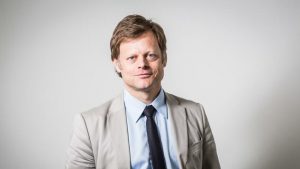Having launched a war of aggression and failed to win it, Russian President Vladimir Putin has little to celebrate these days. What will cheer him is seeing lots of western Europeans take to the streets this fall. He’ll use every prod and spur in his disinformation arsenal to goad the protesters into dividing their own societies — thereby weakening the international front against him.
This fall, civil unrest is likely to heat up in 101 countries (out of 198 monitored), according to an index developed by Verisk Maplecroft, a research firm. Hotspots range from Sri Lanka and Algeria to relatively well-off Europe. The main driver is of course inflation, especially the soaring costs of food and energy (caused in large part by Putin). But other factors come into play. The Czechs and Germans have provided early glimpses of a particularly disturbing pattern.
Tens of thousands of people took to the streets of Prague the other day. They demanded that the European Union drop sanctions against Russia, strike a new gas deal with Putin and stop arming Ukraine. Many blamed the EU and Nato, rather than Putin, for whatever is wrong in the world. Notable speakers included rabble-rousers from the far right and the far left.
The Czechs passed the baton northward, to the region that used to be East Germany, where thousands rallied in Leipzig and Magdeburg. Again, the demonstrators’ ostensible bugbears were inflation, energy prices, and an allegedly callous and inept political elite. But the protesters appeared at least as eager
to express sympathy for Putin, indifference towards Ukraine, and vitriol toward the American-led West. As in Prague, they came disproportionately from the populist far right and the post-communist left.
The party mobilising Germans on the far right is the Alternative for Germany (AfD); representing those at the other extreme is The Left, a party that descends from the communist regime that ruled over East Germany. Both are largely irrelevant in the former West Germany, but part of the mainstream in alienated eastern regions. In the state assembly of Thuringia, the AfD and Left together would (if they collaborated) have a majority of seats.
For the fall, both parties are promising a “Hot Autumn against Cold Feet,†as one slogan has it, with rallies planned every Monday. Officially, though, they’re going out of their way to distance themselves from one another. In the conventional political spectrum, after all, they’re supposed to be diametrical opposites.
In reality, there’s suspicious overlap in their worldviews. Their supporters come from the same (mainly eastern German) milieus that also protested against refugees in 2015-2016 and against Covid rules more recently. They appear disproportionately eager to recycle conspiracy theories.
It’s hardly news that the hard left and right share a lot of psychological DNA — Benito Mussolini was a socialist before he stood for fascism. The mindset on both sides is authoritarian, populist and collectivist as opposed to individualist — the main difference being the targets of their resentment (the rich for the left, tribal outsiders for the right). And they’re all strangely pro-Russian.
These leanings make those on the political fringes all over Europe an ideal audience of “useful idiots†— the terminology is ascribed to Lenin — for the Kremlin’s propaganda in the West. That applies to populists from France to Italy and beyond. But Putin — who plied his trade as a KGB agent in East Germany during the 1980s — knows his useful idiots in central Europe best.
In places formerly held hostage by the Kremlin behind the Iron Curtain, this resurgent Russophilia is bitterly ironic — a case of collective Stockholm Syndrome. Hungary may be the worst example, but eastern Germany is also shocking. As though highlighting their cynicism, the AfD and Left have even chosen Mondays for this fall’s rallies, in a nod to the “Monday demonstrations†by East Germans in 1989 that led to the fall of the Berlin Wall.
This cocktail of gullibility and bad faith is, understandably, hard to bear for other Europeans who used to be behind the Iron Curtain, and were victims
of the Tsars even before
the Soviets. Besides the Ukrainians, these include the Poles, Lithuanians, Latvians and Estonians.
They consider Putin an existential threat, and by extension the perceived wobbliness of their Western allies, notably Germany, a form of betrayal — hardly the first in their history.
In its protracted standoff against Putin and the brutish neo-imperialism he represents, the West can only win if it stays united. This is why Putin will do his utmost to keep spreading lies and disinformation in the West, in the hope of building a “fifth column†that fights for him from behind enemy lines. Western leaders — and not only those holding political office — must do everything they can to call out those lies and counter them with truth. The biggest test yet will come during this hot autumn.
—Bloomberg
Andreas Kluth is a Bloomberg Opinion columnist covering European politics. A former editor in chief of Handelsblatt Global and a writer for the Economist, he is author of
“Hannibal and Meâ€
 The Gulf Time Newspaper One of the finest business newspapers in the UAE brought to you by our professional writers and editors.
The Gulf Time Newspaper One of the finest business newspapers in the UAE brought to you by our professional writers and editors.

